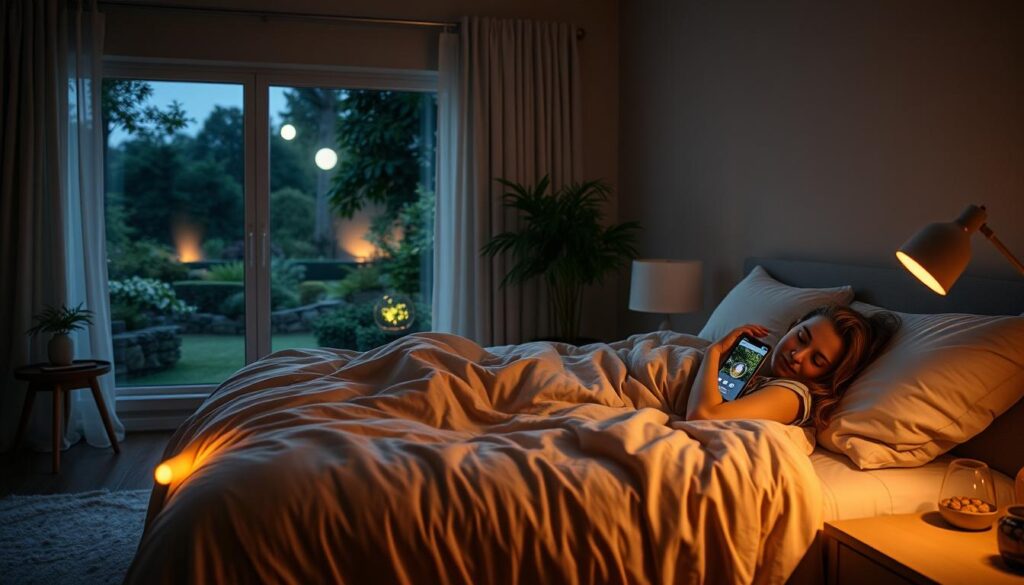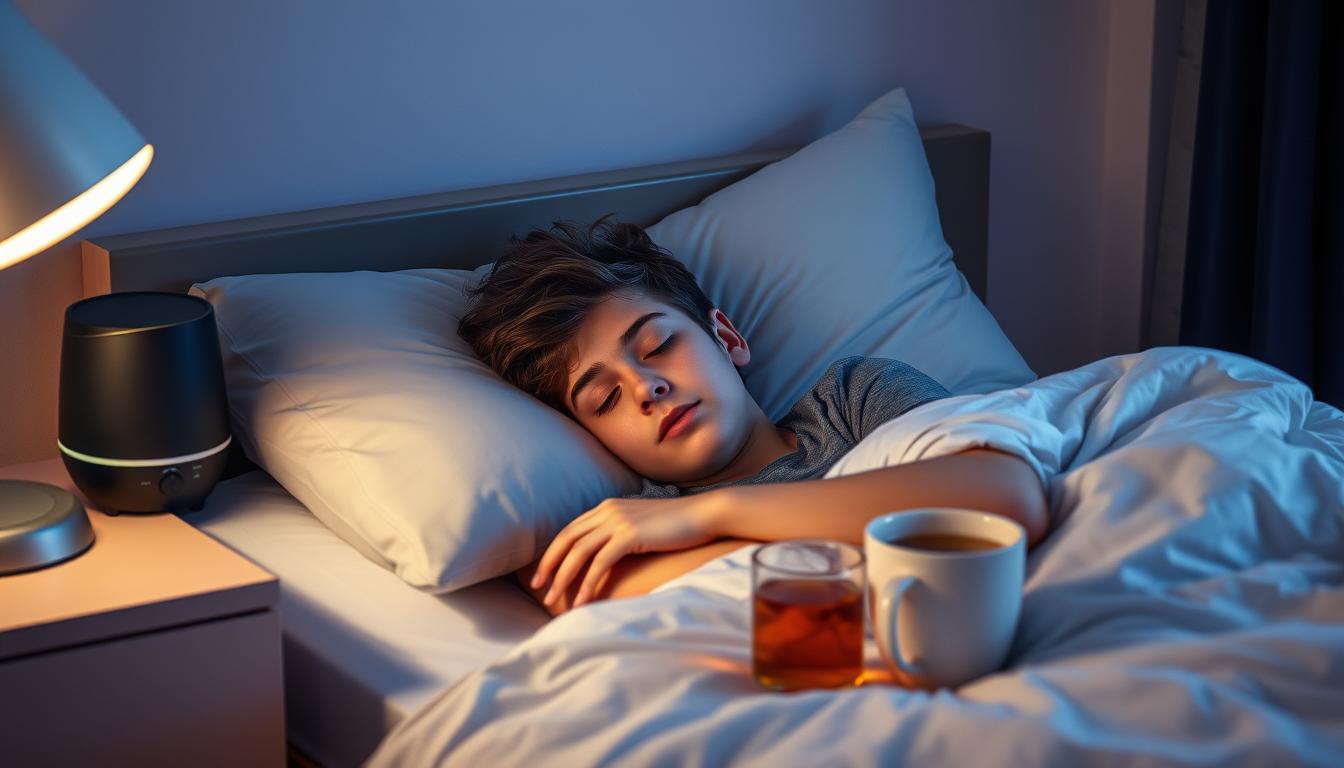Teens today face unique sleep challenges, and finding the best sleep aids for teenagers requires careful choices. Quality rest fuels their growth, mood, and school performance, making safe solutions essential. This guide helps families explore options while prioritizing health and safety.
Key Takeaways
- Sleep impacts teen brain development and daily focus.
- Exploring the best sleep aids for teenagers involves checking safety and side effects.
- Healthcare providers should always review any sleep aid options first.
- Combining sleep aids with routines like consistent bedtimes works best.
- Natural methods and professional guidance reduce risks when using sleep aids.
Understanding Sleep Challenges in Teenagers
Teenagers today face unique sleep struggles that disrupt their well-being. Many struggle to fall asleep, stay asleep, or wake up rested. These challenges often stem from biological changes, school pressures, and tech use. Sleep-inducing techniques for adolescents can help, but first, understanding root causes is key.
Common Sleep Issues
- Delayed sleep phase syndrome (DSPS): natural shifts in circadian rhythms
- Sleep deprivation from late-night screen time
- Irregular weekend sleep schedules
Impact on Daily Life
Academic performance suffers when tired teens struggle to focus. Emotions take a hit too—irritability and anxiety rise. Physical health weakens, raising risks for obesity and weakened immunity. Below shows how issues connect to consequences:
| Sleep Issue | Impact |
|---|---|
| Delayed bedtime routines | Lower exam scores |
| Screen use before bed | Increased daytime fatigue |
Addressing these challenges starts with small steps. Simple changes like limiting phones at night or creating calming bedtime rituals can make a big difference. Prioritizing sleep isn’t just about rest—it’s about building a foundation for healthy growth.
The Importance of Sleep Hygiene for Teens
Healthy sleep habits, known as sleep hygiene, form the foundation of restful nights. For teens, these sleep hygiene tips for teenagers can transform energy levels and focus. Start by setting a consistent bedtime, even on weekends. A calm pre-sleep routine—like reading or gentle stretches—tells your body it’s time to wind down.
“A regular sleep schedule boosts memory and mood,” says Dr. Lisa Carter, a pediatric sleep specialist. “Small changes make big differences.”
- Limit screens before bed: Blue light disrupts melatonin, the sleep hormone.
- Keep rooms cool and dark: A cozy 65°F (18°C) supports deep sleep.
- Avoid caffeine after noon: Sodas or energy drinks can delay falling asleep.
Skipping these sleep hygiene tips for teenagers can lead to daytime drowsiness or irritability. Schools and parents can encourage naps under 30 minutes to recharge without interfering with nighttime rest. Prioritizing sleep hygiene today builds habits that last a lifetime.
Overview of Sleep Aids and Their Uses
Navigating sleep aids can feel overwhelming. Knowing the differences between types helps teens and parents choose safely. Let’s explore options and how they work.
Prescription vs Over-the-Counter Options
Prescription medications require a doctor’s approval. These include drugs like Ambien or Lunesta. Over-the-counter (OTC) options like melatonin supplements or Benadryl don’t need a prescription but still need careful use.
| Type | Examples | Key Factors |
|---|---|---|
| Prescription | Zolpidem (Ambien), Eszopiclione (Lunesta) | Stronger effects; risk of dependency |
| Over-the-Counter | Melatonin supplements, Diphenhydramine (Benadryl), Valerian root | Lower risk but varies in effectiveness |
How Sleep Aids Work
- Melatonin supplements boost the body’s natural sleep hormone.
- Antihistamines like Benadryl cause drowsiness as a side effect.
- Prescription drugs slow brain activity to induce sleep.
“Always consult a healthcare provider before using any sleep aid,” says Dr. James Carter, a sleep specialist. “Safety comes first.”
Effective sleep supplements for adolescents may help when used correctly. But they’re just one part of a full sleep plan. Combining them with good sleep hygiene works best.
Best sleep aids for teenagers
Choosing the right sleep aids starts with prioritizing safety and effectiveness. Here are top options trusted by sleep experts:
- Melatonin Supplements: Look for brands like NOW Foods Melatonin, which offer low-dose formulas (0.5–1 mg) to reset sleep cycles without dependency risks.
- White Noise Machines: Devices like Marpac Dohm Classic block disruptive sounds, creating calming environments.
- Weighted Blankets: Brands such as YnM Gravity Blanket provide gentle pressure, reducing anxiety and promoting deeper sleep.
- Calming Apps: Apps like Calm or Inscape use guided meditations tailored for teens.
“Consistency matters most. Pair aids with a bedtime routine for lasting results.” – Dr. Sarah Williams, Adolescent Sleep Specialist
Always read labels and start with the lowest dose. Avoid caffeine 6 hours before bed and limit screen time. Track progress with a sleep diary to adjust choices. If sleep issues persist, consult a healthcare provider.
Natural Sleep Remedies for Teens
Natural sleep remedies for teens offer a safe way to improve rest without medication. These options focus on herbs and daily habits that support better sleep quality. Let’s explore proven methods to help teens feel more rested.
Herbal Supplements
Some herbs can ease sleep struggles. Always check with a doctor before use:
- Chamomile tea: Calms the mind and body
- Valerian root: May shorten time to fall asleep
- Melatonin supplements: A hormone that signals bedtime to the brain
Start with small doses and monitor reactions.
Lifestyle Adjustments
Small changes make a big difference. Try these steps:
- Stick to the same bedtime and wake time daily
- Turn off screens 1 hour before bed to reduce blue light exposure
- Get 30 minutes of outdoor activity each day
- Keep bedrooms cool, dark, and quiet
A consistent routine helps teens fall asleep faster and stay asleep longer.
Natural sleep remedies for teens work best when combined with patience and consistency. Experiment to find what fits your lifestyle!
Effective Sleep Supplements for Adolescents
When choosing sleep supplements, teens and parents should prioritize options backed by science. Supplements like melatonin, magnesium, and valerian root extracts are popular choices, but their effects depend on proper use.
Science Behind Supplements
Melatonin, a hormone produced naturally in the body, helps regulate sleep cycles. Studies show low-dose supplements can reset circadian rhythms disrupted by late-night screen use. Magnesium glycinate supports muscle relaxation, easing tension that keeps teens awake. Valerian root extracts may boost GABA levels, a neurotransmitter calming the nervous system.
- Melatonin: Aligns with biological clock
- Magnesium: Eases physical tension
- Valerian root: Enhances calming brain chemicals
Safety Considerations
Always consult a pediatrician before use. Start with the smallest dose and monitor reactions. Avoid brands with caffeine or synthetic additives. For example, Nature’s Aid Melatonin 0.5mg tablets are FDA-approved and pediatrician-reviewed.
“Adolescent brains are still developing—supplements must be approached cautiously,” advises Dr. Lisa Klein, sleep specialist at Stanford Children’s Health.
- Check for lab-tested certifications (USP Verified)
- Avoid mixing with prescription medications
- Track sleep patterns for 2 weeks to assess effectiveness
Supplements aren’t a quick fix—they work best with consistent bedtime routines. Always pair them with screen-free wind-down periods and a cool, dark sleep environment.
Over-the-Counter Sleep Aids for Teens
Over-the-counter sleep aids for teens offer quick fixes for occasional sleep struggles. But safety comes first—always check labels and follow instructions. Popular choices include:
- Melatonin supplements (like Nature’s Aid or Now Foods)
- Antihistamines with diphenhydramine (e.g., Benadryl)
- Herbal blends (e.g., Yogi Bedtime Tea)
Start with the lowest dose and avoid long-term use. Side effects like drowsiness the next day or stomach upset can happen. Never mix with alcohol or other medications without medical advice.
Teens and parents should track how the body reacts. If sleep problems persist, consult a healthcare provider. Over-the-counter sleep aids for teens are not substitutes for long-term solutions like better sleep routines.
Sleep-Inducing Techniques for Adolescents
Adolescents can improve sleep quality using proven techniques that calm the mind and body. These methods create a healthy sleep routine without over-reliance on sleep aids. Here’s how to start:
Mindfulness and Relaxation
Quiet the mind with these practices:
- Practice mindful breathing for 5-10 minutes. Inhale for 4 counts, hold, then exhale slowly.
- Use meditation apps like Insight Timer or Headspace for guided sessions.
- Try progressive muscle relaxation: tense and release muscles from toes to head.
Optimizing the Sleep Environment
Create a bedroom that promotes rest:
- Keep the room cool (60-67°F) and dark with blackout curtains.
- Add a white noise machine to mask disruptive sounds like traffic or neighbors.
- Choose a mattress and pillows that support your body’s natural alignment.
Pair these steps with consistent bedtimes and screen-free hours before bed for best results.
Holistic Sleep Solutions for Teenagers
For teens struggling with sleep, holistic sleep solutions for teenagers focus on balancing body, mind, and environment. These strategies avoid relying solely on sleep aids and instead combine habits that improve overall well-being. Let’s explore how small changes can create big impacts.

“A consistent routine and a supportive environment are the foundation of healthy sleep,” says Dr. Lisa Marchell, pediatric sleep specialist at the National Sleep Foundation.
Here are three key areas to address:
- Light exposure: Bright morning light boosts alertness, while reducing screen time before bed. Try natural light during the day and dim lights in the evening.
- Nutrition timing
- Physical activity: Daily exercise improves sleep quality. Aim for 30 minutes of activity but not within 2-3 hours of bedtime.
: Avoid heavy meals late at night. Opt for snacks like almonds or warm milk, which contain sleep-supporting nutrients.
| Method | Benefit | Example |
|---|---|---|
| Bedtime routines | Triggers mental readiness for sleep | Reading or journaling for 15 minutes |
| Temperature control | Optimal sleep occurs at 60–67°F (15–19°C) | Use breathable bedding and adjust thermostat |
| Social support | Reduces stress that disrupts sleep | Family discussions about stress management |
Small adjustments in daily life can create lasting improvements. Holistic sleep solutions for teenagers work best when combined with patience and consistency. Start with one change and build habits over time.
Top-Rated Sleep Aids for Young Adults
When selecting sleep aids, many young adults prioritize options that work well and feel safe. Top-rated sleep aids for young adults often balance these needs. Real-world feedback and professional guidance help identify the best choices.
Consumer Reviews
- Melatonin supplements like Nature’s Bounty Melatonin rank high for their quick, temporary relief.
- Lavender sprays such as Eden’s Garden Lavender Room Spray are praised for calming bedrooms.
- White noise machines like the Marpac Dohm Classic top charts for masking nighttime noise.
Expert Recommendations
“Look for aids with minimal side effects,” advises Dr. Emily Carter, a sleep researcher. “Stick to FDA-approved or natural products first.”
Top picks from professionals include:
- Nature Made Calming Rest for magnesium-based relaxation support.
- Weighted blankets like YnM Gravity Blanket to ease stress-induced insomnia.
How to Navigate Risks and Manage Side Effects
Using sleep aids responsibly starts with knowing their limits. Always read labels and follow dosage instructions. Never mix sleep aids with alcohol or other medications without medical advice.
- Track side effects like drowsiness, headaches, or mood changes.
- Stop use immediately if symptoms worsen or new issues arise.
- Consult a doctor before combining with prescription drugs.
Some teens may experience dependency or rebound insomnia. Avoid long-term use without professional guidance. Check for contraindications like asthma, depression, or prior allergies. Keep sleep aids stored safely to prevent accidental misuse.
“Side effects often signal the need for a care plan adjustment,” says Dr. Emily Carter, a pediatric sleep specialist. “Regular check-ins with a healthcare provider are key to balancing safety and effectiveness.”
Watch for red flags like difficulty breathing or persistent drowsiness during the day. Discuss all concerns with a trusted healthcare provider. Prioritizing communication and cautious use helps maintain teenagers’ sleep safety.
Expert Advice and Medical Considerations
When choosing sleep aids for teens, expert guidance is key. A doctor can assess individual needs and suggest safe options. Always consult a healthcare provider before starting any treatment.

Consult Healthcare Providers
Doctors evaluate health history and current medications to avoid interactions. They can recommend: prescription sleep aids, natural remedies, or lifestyle changes. Regular check-ins ensure treatments stay safe and effective.
- Discuss all current medications to prevent interactions
- Get personalized advice tailored to your teen’s health
- Monitor progress with a professional’s guidance
When to Seek Professional Help
Some signs require immediate care. Seek help if your teen experiences:
| Symptom | Action |
|---|---|
| Insomnia lasting weeks | Consult a sleep specialist |
| Daytime fatigue affecting school | Visit a pediatrician |
| Mood changes or anxiety | Ask for mental health referral |
Early intervention helps avoid long-term issues. Trust your instincts—don’t delay care if concerns arise.
Lifestyle Modifications to Support Healthy Sleep Patterns
Small changes in daily routines can make a big difference in sleep quality. Teens can build habits that promote rest without relying heavily on sleep aids. Here’s how to start:
Routine Building
- Stick to a consistent bedtime and wake-up time, even on weekends.
- Limit caffeine after noon—try herbal teas like chamomile instead.
- Create a calming pre-sleep ritual, such as reading or journaling.
Digital Detox Tips
Screen time before bed can disrupt sleep cycles. Try these steps:
- Turn off devices 1–2 hours before bed to lower blue light exposure.
- Use night mode settings on phones or tablets to reduce harsh light.
- Replace scrolling with a 10-minute meditation app or a quiet hobby.
These adjustments take time, but they’re worth it. Even small steps like reading a book instead of watching videos can improve sleep quality. Consistency is key—try one change at a time and see what works best.
Conclusion
Healthy sleep habits are essential for teenagers to stay focused and energized. When exploring sleep aids, prioritize safety by consulting doctors and understanding risks. Natural options like chamomile tea or mindfulness exercises can help without side effects. Always pair sleep aids with good sleep hygiene: set consistent bedtimes and create a quiet, dark space for rest.
Cutting screen time and avoiding caffeine boost sleep quality naturally. If challenges persist, talk to a sleep specialist to find personalized solutions. Small steps like these build a strong foundation for better rest. Teens who combine safe sleep aids, healthy routines, and professional guidance can improve their sleep and overall well-being. Prioritizing these steps today leads to brighter mornings and stronger days ahead.
FAQ
What are the best sleep aids for teenagers?
The best sleep aids for teenagers include options like melatonin supplements, diphenhydramine, and herbal remedies such as valerian root or chamomile tea. It’s essential to choose products labeled for adolescents and consult a healthcare provider for suitable recommendations.
Are there natural sleep remedies for teens?
Yes, natural sleep remedies for teens include herbal supplements like passionflower and magnesium. Additionally, promoting good sleep hygiene and lifestyle adjustments can greatly enhance sleep quality, such as establishing a bedtime routine and reducing screen time before bed.
What sleep hygiene tips should teenagers follow?
Teenagers should aim for a consistent sleep schedule, create a relaxing bedtime routine, and maintain a comfortable sleep environment—dark, quiet, and cool. Limiting caffeine and electronic devices in the evening also encourages better sleep hygiene.
What are effective sleep supplements for adolescents?
Effective sleep supplements for adolescents can include melatonin and magnesium. It’s important for teenagers to use these supplements under the supervision of a healthcare provider to ensure safety and appropriate dosages.
Are there over-the-counter sleep aids suitable for teens?
Yes, over-the-counter sleep aids like diphenhydramine (found in Benadryl) and certain formulations of melatonin are options. However, it’s crucial for teens to use these products cautiously and ideally after consulting with a healthcare provider.
What sleep-inducing techniques can adolescents use?
Adolescents can try mindfulness practices, such as meditation or deep-breathing exercises, as well as relaxation techniques like progressive muscle relaxation. Creating a serene sleep environment with dim lighting and calming scents can also help induce sleep.
How can teenagers find holistic sleep solutions?
Holistic sleep solutions for teenagers may include lifestyle changes like regular physical activity, balanced nutrition, and stress management techniques. Integrating natural remedies, such as aromatherapy or yoga, can provide additional support for better sleep.
What are the top-rated sleep aids for young adults?
Top-rated sleep aids for young adults often include melatonin, herbal options like valerian root, and products designed with young adult needs in mind. Reviews from fellow users and expert recommendations can help guide choices in selecting the right sleep aid.
How can I manage the risks and side effects of sleep aids?
To manage risks and side effects of sleep aids, teens should follow recommended dosages, monitor their body’s responses, and maintain communication with a healthcare provider. Identifying any adverse reactions early on is essential for safety.
When should teens consult healthcare providers regarding sleep aids?
Teens should consult healthcare providers if they are experiencing persistent sleep issues, considering starting a new sleep aid regimen, or if they have any pre-existing health conditions or are taking other medications that may interact.
What lifestyle modifications can help support healthy sleep patterns?
Lifestyle modifications for better sleep include establishing a consistent sleep routine, practicing digital detox by limiting screen time before bed, and incorporating relaxation activities into daily life, such as reading or light stretching.
